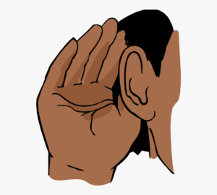Hi there! It’s Livia here! We recently had a workshop with Mariem Omari all about verbatim theatre. This is a form of theatre where a script is created from real words which people actually spoke. Most verbatim practitioners, like Mariem, conduct interviews with people who have experience with a specific issue - such as mental health struggles or homelessness - they want to write about, and use recordings from these interviews to create the text of the play. During our workshop, Mariem went in-depth on her process of creating a play, including how she finds people to interview, how she conducts the interviews, tackles her material, and shapes it into a play. This was interesting to me, as I already knew quite a bit about the academic side of what verbatim is, but I had no idea about the work that actually goes into taking hours and hours’ worth of text and transforming it into something that works on stage.
Mariam also introduced the idea of “deep listening”. This was a fascinating technique that she uses when interviewing someone. Normally when we are having a conversation, we are always thinking ahead to what we might say next, so much so that it can stop us from properly listening and appreciating what the other person has to say. “Deep listening” involves stopping this impulse, by giving the other person the time and space to fully express themselves, even if it means leaving silences or gaps in conversation. This is essential in verbatim because you are trying to tell their story, not your own, and by giving the interviewee time to finish expressing themselves, they can form their thoughts and sentences without your influence or input. This helps achieve the “genuine” or “real life” speech that the whole idea of verbatim is based on. I think this can be useful for me to think about when engaging with others in my normal life, as well in terms of verbatim interviews, as paying attention to the stories and voices of others can be fascinating and useful. Listening closely to other people speaking can be useful as a writer trying to analyse the voices of others to recreate or imitate in your own words.
Mariam also left us with an exercise to complete in which we had to ask someone a question and record their response in a mini verbatim-style interview. This was an interesting experience for me because I interviewed one of my flatmates, so it meant moving from a casual, back and forth dialogue that we normally have, to a more professional, interview-style conversation. This was somewhat difficult, as I had to think carefully about what I said and how to prompt some material out of them, but beneficial moving forwards, as a practice interview if I do decide to try verbatim work again in the future. Some of the quotes I got ended up being fascinating, as it feels really unlike dialogue I would write myself, but really true to him. For example, I was asking him about how he feels to be out and about again after months of being in lockdown, and he said;
"It's weird on a subconscious level, but not a Covid level. Like when you know something's right, but in the back of your head, you worry. And it feels like everybody's watching you everywhere you go because if you cough once it's game over."
I would be interested to write a verbatim play at some point, but I think this might be a writing project I would probably not take on this year. I really enjoy the format, but if I were to take on the task, I would want to do it justice. Juggling research, contacting people to interview, interviews, transcription alongside everything else that’s keeping me busy at the moment is a huge commitment. I think some of the main ideas of verbatim – engaging with real-life stories, and gaining inspiration from the real world are definitely inspiring to me, and I will keep them in mind moving forwards.
Livia Nicholson
Livia is part of the Bunbury Banter Young Playwrights Programme 2020-2021



Comments
Post a Comment